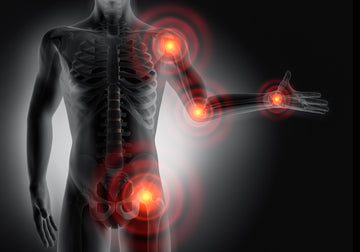Inflammation is a natural and essential part of the body’s healing process. When you injure yourself or get an infection, your immune system responds with acute inflammation, a short-term response that helps to fight off harmful invaders and promote healing. However, when inflammation becomes chronic, it can turn into a silent enemy, causing damage over time without obvious symptoms. Chronic inflammation is a slow, long-term inflammatory response that can last for months or even years. Here’s how this hidden condition can harm your body without you even knowing it.
Understanding chronic inflammation
Chronic inflammation occurs when the body’s immune response is continuously active, even without an apparent injury or infection. This ongoing inflammatory state can be triggered by various factors, including poor diet, stress, smoking, environmental toxins, and underlying health conditions like obesity or autoimmune disorders. Unlike acute inflammation, which is beneficial and necessary for healing, chronic inflammation can lead to a host of health problems.
How chronic inflammation affects your body
Cardiovascular disease

-
Atherosclerosis: Chronic inflammation can damage the inner lining of arteries, leading to the buildup of plaque, a condition known as atherosclerosis. This can increase the risk of heart attack and stroke.
-
Hypertension: Inflammatory molecules can cause blood vessels to narrow, raising blood pressure and putting additional strain on the heart.
Metabolic disorders

-
Type 2 diabetes: Inflammation can interfere with insulin signaling, leading to insulin resistance and eventually type 2 diabetes.
-
Obesity: Fat tissue itself can produce inflammatory molecules, creating a vicious cycle that promotes further weight gain and metabolic disturbances.
Joint and musculoskeletal problems

-
Arthritis: Chronic inflammation is a major factor in rheumatoid arthritis and other inflammatory joint diseases, causing pain, stiffness, and swelling.
-
Osteoporosis: Inflammatory cytokines can promote bone resorption, leading to weakened bones and an increased risk of fractures.
Digestive issues

-
Inflammatory bowel disease (IBD): Conditions like Crohn’s disease and ulcerative colitis are characterized by chronic inflammation of the digestive tract, leading to pain, diarrhea, and other gastrointestinal symptoms.
-
Leaky gut syndrome: Chronic inflammation can damage the lining of the intestines, allowing harmful substances to enter the bloodstream and trigger further immune responses.
Tumor growth

Chronic inflammation can create an environment that promotes the growth and spread of cancer cells. Inflammatory cells can produce substances that stimulate tumor growth and invasion.
Identifying chronic inflammation
One of the challenges of chronic inflammation is that it often doesn’t produce obvious symptoms. However, there are some signs and markers that can indicate its presence:
-
Persistent fatigue
-
Unexplained aches and pains
-
Digestive problems such as bloating and diarrhea
-
Skin issues like eczema or psoriasis
-
Frequent infections
-
Medical tests can also measure markers of inflammation, such as C-reactive protein (CRP), erythrocyte sedimentation rate (ESR), and certain cytokines.
Managing and reducing chronic inflammation
Addressing chronic inflammation involves lifestyle changes and, in some cases, medical interventions. Here are some strategies to manage and reduce inflammation:
-
Healthy diet: Focus on anti-inflammatory foods such as fruits, vegetables, whole grains, lean proteins, and healthy fats. Avoid processed foods, sugary drinks, and excessive alcohol.
-
Regular exercise: Physical activity can reduce inflammation and improve overall health.
-
Stress management: Practices such as meditation, yoga, and deep breathing can help manage stress and reduce inflammatory responses.
-
Adequate sleep: Ensure you get enough restorative sleep, as poor sleep can exacerbate inflammation.
-
Avoid smoking: Smoking is a major contributor to chronic inflammation and quitting can significantly improve your health.
-
Medical treatment: In some cases, medications such as anti-inflammatory drugs or treatments for underlying conditions may be necessary.
Chronic inflammation is a hidden threat that can quietly damage your body over time, leading to serious health problems. By understanding the risks and adopting a proactive approach to reduce inflammation, you can protect your long-term health and well-being.
Reference:








